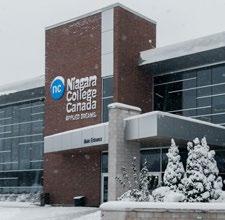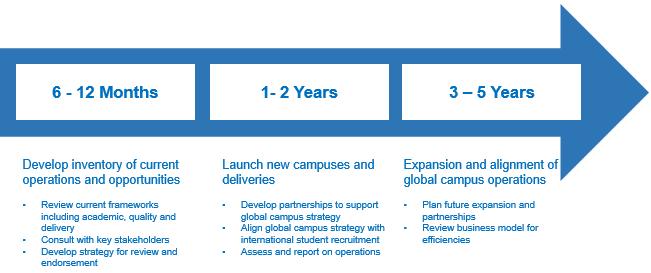












2022-2027








Niagara College is located on the traditional territory of the Haudenosaunee and Anishinaabe peoples, many of whom continue to live and work here today. This territory is covered by the Upper Canada Treaties and is within the land protected by the Dish with One Spoon Wampum agreement.
Today this gathering place is home to many First Nations, Métis, and Inuit peoples and acknowledging reminds us that our great standard of living is directly related to the resources and friendship of Indigenous peoples.
I am excited to share the Niagara College Global Strategy. This strategy builds on our previous international strategy and outlines an evolution of our international work over the next five years. A shifting paradigm from “international” to “global” will inform our 2022-2027 Global Strategy. Building on over 20 years of success, we will continue to leverage our strengths as we move forward in a post-pandemic era.

In keeping with the 2022-2027 NC Strategic Plan, we will nurture student success through a wholistic lens, focus on current and new partnerships and infuse global engagement in everything we do. Our strong relationships around the world have laid the foundation to expand our work in global development projects, contract training and consultation and off-shore operations and programming. The School of English Language Studies will continue to evolve and expand to support English as a Second Language students in Niagara and abroad. We also remain committed to building global competencies among our staff and students by fostering global engagement opportunities, both inside and outside of the classroom under our Be World Ready initiatives.
As international enrolment has increased substantially, careful consideration will be given to diversification of student culture and specialized international programming while maintaining a balance between domestic and international students, especially at our Niagara campuses. Our passion for providing an unprecedented student experience will remain the underpinning of work and will only continue to magnify our already strong reputation.
My sincere thank you to everyone who contributed to this global strategy. I look forward to working with each of you to bring this exciting strategy to life and to see Niagara College emerge as Canada’s Leading Global College.
Sincerely,

As outlined in the 2021 report from the Office of the Auditor General of Ontario, concerns have been raised about the financial sustainability of public colleges given declining domestic enrolment, lowered tuition grants from the Ministry and tuition freezes for domestic students. To help mitigate these challenges, public colleges have seen significant growth in international education and Niagara College is no exception.
Over the past seven years, international enrolments in Ontario public colleges grew 342% while domestic enrolments declined by 15%. It is anticipated that this growth will continue which can provide a great opportunity for NC, if we are purposeful in our planning and execution of bringing international students to NC. Principles to guide NC’s strategic planning, include:
• Right balance of domestic and international students
• Diversity of international student cultures
• Balance of domestic and international attractive programs
• Proper student supports are in place
• Good community integration of internationals students
Emerging middle classes around the world and the value placed on a foreign, English education has also contributed to the substantial increase in international students studying in Canada. Canada’s immigration policies and overall lifestyle reputation makes Canada an attractive option for students considering international education. The Ontario college educational model makes international education attainable for a much larger population globally. This may be attributed to factors such as our link between education and the workplace, our competitive price and labour needs that allow students to secure part time work while studying to support the cost of their education and gain valuable Canadian work experience during their studies and after they graduate.
What has become clear is that the demand for NC programs continues to exceed our capacity at our Niagara campuses. Based on a variety of factors, including physical space; living accommodations; transit; employment; domestic / international student balance; programs and on-campus and off-campus culture. Continued growth at significant rates at our Niagara campuses over the coming years cannot be supported easily. In considering the above factors, the college will increase capacity in certain programs and develop new programs to address international student
demand, while matching local and global labour demands and immigration regulations. This could include, but should not be limited to, increased internationally focused program offerings, expanded graduated healthcare programs, and more capacity across certain current programs in the college. The college will also focus its efforts on spreading international students across all three terms allowing us to distribute the campus usage over all three terms.
To keep up with significant changes in technical and vocational education and training (TVET), needs from employers, countries and governments continue to invest in reform of TVET at significant levels. This increased global demand for TVET reform positions NC well to expand its global operations, building on our teams’ many years of experience in this capacity building sector.
In 2019, the Canadian Federal Government’s released an International Education Strategy, that highlighted key areas of focus, including: increased study/work abroad; diversification of international students; and increased support for educational export services. Considerable investments were also included, which will be important for NC to capitalize on in support of the global strategy.
Student nationality and cultural diversification targets must be established to ensure a cohesive approach to the overall financial sustainability and the student culture both at the college and within the community. From 2015-2020, we saw significant percentage increases from many regions and countries, including: Brazil; the Caribbean; Ghana; Nigeria; the Philippines; South Korea; Kingdom of Saudi Arabia (KSA); Taiwan; Ukraine; USA; Vietnam; and others, but all these combined did not compare to the exponential increase of students from India and decrease from China. The remarkable increase of Indian students was seen system-wide with 62% of all international students in Ontario public colleges originating in India in 2020/21. Strategized student diversification will ensure all our students have the benefit of bringing the world to the classroom. Although we recognize the cost of diversifying is more expensive from a recruitment and service perspective, the impact of diversity for all of NC’s students is vital to being Canada’s Leading Global College.
In 2015, as part of the international diversification strategy, we set out on a five-year plan to better balance our Niagara enrolment with other Canadian enrolment and off-shore enrolment. Niagara College has a proven track record of taking the best of what we do in Niagara to other parts of the world. These activities include:
• International campuses or program delivery
• International projects where we share best practices to support the development of partner organizations around the world, typically funded by a development bank or agency
• International corporate contract training for foreign companies, agencies, or educational partners
Building on NC’s previous diversification strategy, significant expansion will continue with a goal of balancing the college’s international student revenue over the coming five years. To do this, our Global Engagement Division will focus its efforts on international campuses and program delivery, while continuing to grow global development projects and contract training, both in terms of capacity and activities. This expansion will include complementary operations in the Kingdom of Saudi Arabia and additional development with key partners in target markets in Canada and around the world. The campus developments will provide both financial contributions and will act as feeder deliveries for Niagara College Canada operations.
In 2022, Niagara College launched a new strategic plan, that included a key area of focus of Global Reach. As outlined in the strategic plan, the emphasis on Global Reach will be focused on a set of actions, including:
• WE WILL support a culturally diverse college and bring the World to Niagara, contributing to enhanced perspectives and learning for all students
• WE WILL bring Niagara to the World and expand global operations and program delivery outside of the Niagara region to support international capacity building
• WE WILL prepare graduates by creating pathways to the world through Be World Ready experience opportunities inside and outside the classroom for all students
• WE WILL create an inclusive and integrated campus environment where all students engage, support, and learn from each other
The strategy, although complex and challenging to execute, is rather simple to describe. Take the best of what we do at NC Canada and deliver it globally!
Building on Niagara College’s success and experience in delivering advanced applied education in Niagara and Saudi Arabia, NC will continue to expand our global operations in alignment with NC Canada’s strategic plan and ensure a balanced global portfolio that will be integral to NC’s future. The global strategy will also help mitigate any significant shift in our business model with a focus on a diverse set of global activities that will bring strong net contributions to NC while building global competencies among our staff and students. This will include building on our previous plan in three areas:



Bringing the World to Niagara
Taking Niagara to the World
Preparing World Ready Graduates and Staff




Niagara College has a long history of bringing international students from around the world to Niagara. These students will continue to study in programs across NC and will be an important part of our strategic enrolment management strategy. To accomplish this objective:
1. Recruit international students for all schools across the college, maintaining a significant international student population at our Niagara campuses to support colleges enrolment goals
2. Diversify our international student demographics to provide a broader cultural experience on our campuses
3. Support international student settlement and integration across the college and Niagara community to foster strong relationships
4. Provide unparalleled international student supports and services to ensure student success
5. Balance domestic and international student enrolment by developing new (or expand existing), attractive international programs to address student demand, while matching labour demands and immigration regulations
Niagara College’s global campuses strategy will expand operations over the next five years, balancing our in-Canada and overseas operations. This strategy will ensure that there are diverse pathways for students to start their NC education journey at satellite NC locations, yield strong net profits for NC as well as support our Be World Ready program. The following illustrates the key milestone for the duration of the plan.


WE WILL expand our Canadian campuses in partnership with Global University Systems, or others beyond Toronto, with a goal of 5,000+ students at these campuses each year to bring significant ($15M+) net contributions to NC annually. This revenue will be used to support significant investments into the student experience and learning such as teaching equipment, campus renewals and other capital equipment. We should be careful about using these funds to support operational shortfalls, as there is a risk that should the post-graduate work permit immigration rules change that these public college-private partnership enrolments will decrease significantly.
WE WILL also expand our Niagara College Kingdom of Saudi Arabia (NC KSA) operations to build on our success with Colleges of Excellence to establish ourselves as a preferred provider for TVET program delivery

in the Middle East. This expansion should balance both short- and long-term contracts with a variety of funding organizations. NC KSA will continue to contribute net profits to NC Canada of $2M-5M annually, which can be used to support NC Canada operations.
WE WILL also expand our off-shore program delivery with partners in growth markets. These off-shore deliveries will act as feeders to NC Canada’s student base. This will ensure that these students can study for a shorter period in Canada, but still receive the same quality and opportunities as students who complete their entire studies at NC Canada. This expansion will also ensure students are better prepared for their studies in Canada and will allow NC Canada to have a more predictable stream of students for key programs. These partnerships will also support Be World Ready travel opportunities.

NC has a long history of leading development projects worldwide. This history started in the late 1980s with projects in China, and has continues with significant projects in Argentina, Belize, Bhutan, Brazil, Chile, Colombia, Ecuador, Malawi, Palestine, Peru, Hungary, Jamaica, Kenya, South Africa, St. Lucia, St. Vincent and Grenadines, Tanzania and others. These projects are typically funded by development banks or agencies and have us partnered with one or more foreign educational institutions delivering a defined set of objectives. Colleges and Institutes Canada (CiCan) has established themselves as a lead on many of these funded development initiatives, as often the objectives are greater than any one college or institute can easily take on themselves. CiCan can leverage their 130+ members across Canada to fulfill parts of the overall development objective.
NC has established a strong reputation with CiCan and several other agencies that help to distribute funding for development projects and we continue to build on that reputation. The net profits from these projects are not significant, but they do provide our staff and students with opportunities to share best practices and gain global competencies through the delivery of the project objectives. As NC continues to build our reputation and experience in delivering part of larger funded initiative through CiCan or other agencies, we will be able to go directly to these funding agencies to secure project awards. This approach has the potential to be more profitable since we would take on both the project management and project delivery aspects of the awards.
These projects provide significant points of career pride for NC staff who are involved with their delivery as they enable our staff to step out of their routines and expand their global experiences, while reflecting on and sharing best practices. These opportunities act as a form of professional development for participants by fostering growth to become better practitioners.

Over the coming five years, WE WILL expand our international development project work to support our organizational culture as a global college and contribute to a better world as global citizens. This expansion should include both CiCan administered projects and directfunded projects. The CiCan project will continue to provide ‘first time’ international development experiences for staff, while the direct-funded projects will use our more experienced staff to build on their previous development project experiences.
NC has had significant experience in inbound international contract training, but little experience in overseas delivery of contract training, outside of KSA. Our experience with inbound contract training has primarily focused on providing our foreign academic partner institutions with training at our NC campuses for their students or staff. This training in Canada has developed strong institutional partnerships with schools around the world that we should expand on as part of our off-shore campus planning, and our Be World Ready initiatives. Both inbound and overseas contract training have proven to be profitable and consistently take the best of what we do in Canada to our overseas partners. Over the coming five years, we should continue to expand our inbound contract training and significantly grow our overseas contract training with our educational partners and in areas where we have significant expertise that is needed globally.
1. Expand off-shore program delivery with partners around the world through various operation models to deepen our relationships with our global academic partners and provide pathways to NC
2. Increase international development project work with a variety of funders to support our organizational culture as a global college
3. Expand our Canadian campuses beyond Toronto to enhance our partnership with Global University Systems (GUS)
4. Grow inbound and overseas contract training to support our global partners and build on our expertise at NC
5. Increase NC KSA operations, building on our success with Colleges of Excellence to establish ourselves as a preferred provider for TVET program delivery in the Middle East
Bold goals have been embraced around the world by institutions and governments with examples such as the European Union; they are investing $20.5 billion to increase student and staff mobility in Europe. Germany has set a goal of 50% mobility. National governments like Australia and Canada are investing millions to support student mobility and the Canadian Bureau for International Education (CBIE) has stated that Canada's goal for student mobility should be targeted at 15%. These investments and declarations have resulted in student engagement in study/work abroad increasing significantly from an annual average of just over 60 students to over 600 students in 2019/20, before the global pandemic.

Students in a range of international field studies, exchanges, internships, degree completion pathways, and global classroom projects currently have the opportunity to gain World Ready skills in China, Ecuador, France, Germany, Ireland, Italy, Jamaica, Korea, Peru, South Africa, Spain, and the USA. Students at home also learn World Ready skills through their academic programs and hundreds participate in on campus cultural events. These programs will prepare World Ready graduates who demonstrate the knowledge, skills and attitudes that will distinguish them in the job market and contribute to personal growth. To develop into World Ready graduates, Niagara College students have the opportunity to: experience a culturally-diverse learning environment, understand local and international perspectives, and connect global skills to their career success.

The success of internationalization initiatives depends on strong staff engagement and support. Over the past five years, there has been growth of "champions" in faculty and staff who have helped to lead and build interest in study/work abroad initiatives. This is crucial to

the success of internationalization initiatives and ensuring wide student engagement. Faculty work with students on a day-to-day basis and directly influence the success of international initiatives.
NC was recently awarded $1M in study/work abroad funding from the federal government, as part of a $95M Outbound Student Mobility program. This recently awarded project funding is based on two proposals, Local to Global & Global Employment Opportunities, and each project will receive $500K of funding. The approved proposals will support 1,500 NC students to have study/work abroad experiences both virtually and physically over the next four years.
Niagara College’s long-term success in preparing World Ready graduates and staff rests on an institutional capability to facilitate international study and work abroad opportunities. Be World Ready has set in motion steady growth in outbound staff and student mobility at the College. A review and revision of enabling policies and procedures to open the doors and encourage international activities and engagement by faculty, support staff and management will be undertaken as part of operationalizing a World Ready Niagara. Opportunities for staff to engage in international teaching opportunities, research, consulting and economic development, campus abroad, and leading field studies are part of the internationalization strategy to build skills and ownership of a global Niagara College.
1. Infuse global competencies within our academic programs and across college operations
2. Expand opportunities for students to study/work abroad
3. Ensure every student has BWR opportunities available to them and every school has opportunities for their students
4. Mobilize World Ready Niagara staff, faculty and students to NC global sites and educational destinations globally
5. Leverage federal funding to financially support Be World Ready